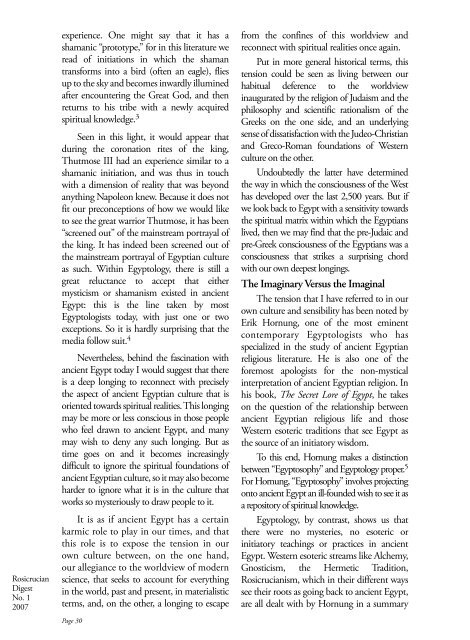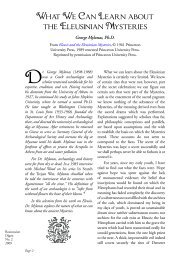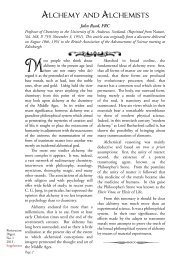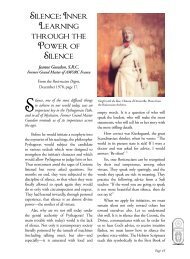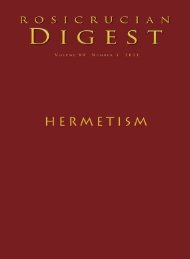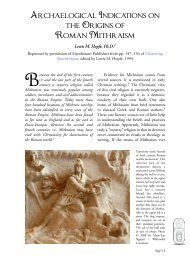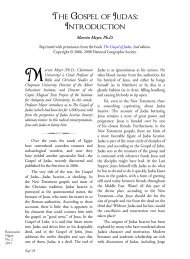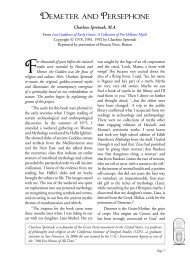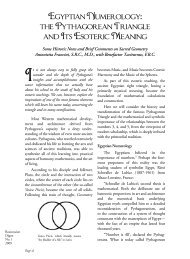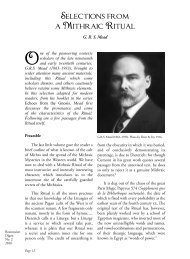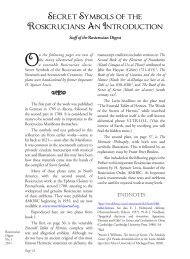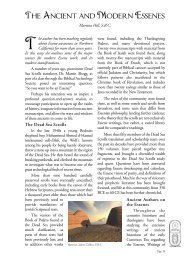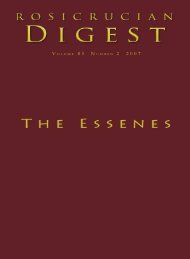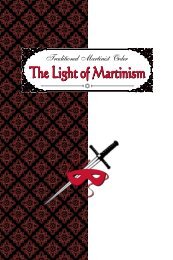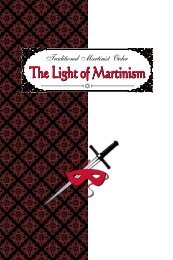Digest - Rosicrucian Order
Digest - Rosicrucian Order
Digest - Rosicrucian Order
Create successful ePaper yourself
Turn your PDF publications into a flip-book with our unique Google optimized e-Paper software.
<strong>Rosicrucian</strong><br />
<strong>Digest</strong><br />
No. 1<br />
2007<br />
experience. One might say that it has a<br />
shamanic “prototype,” for in this literature we<br />
read of initiations in which the shaman<br />
transforms into a bird (often an eagle), flies<br />
up to the sky and becomes inwardly illumined<br />
after encountering the Great God, and then<br />
returns to his tribe with a newly acquired<br />
spiritual knowledge. 3<br />
Seen in this light, it would appear that<br />
during the coronation rites of the king,<br />
Thutmose III had an experience similar to a<br />
shamanic initiation, and was thus in touch<br />
with a dimension of reality that was beyond<br />
anything Napoleon knew. Because it does not<br />
fit our preconceptions of how we would like<br />
to see the great warrior Thutmose, it has been<br />
“screened out” of the mainstream portrayal of<br />
the king. It has indeed been screened out of<br />
the mainstream portrayal of Egyptian culture<br />
as such. Within Egyptology, there is still a<br />
great reluctance to accept that either<br />
mysticism or shamanism existed in ancient<br />
Egypt: this is the line taken by most<br />
Egyptologists today, with just one or two<br />
exceptions. So it is hardly surprising that the<br />
media follow suit. 4<br />
Nevertheless, behind the fascination with<br />
ancient Egypt today I would suggest that there<br />
is a deep longing to reconnect with precisely<br />
the aspect of ancient Egyptian culture that is<br />
oriented towards spiritual realities. This longing<br />
may be more or less conscious in those people<br />
who feel drawn to ancient Egypt, and many<br />
may wish to deny any such longing. But as<br />
time goes on and it becomes increasingly<br />
difficult to ignore the spiritual foundations of<br />
ancient Egyptian culture, so it may also become<br />
harder to ignore what it is in the culture that<br />
works so mysteriously to draw people to it.<br />
It is as if ancient Egypt has a certain<br />
karmic role to play in our times, and that<br />
this role is to expose the tension in our<br />
own culture between, on the one hand,<br />
our allegiance to the worldview of modern<br />
science, that seeks to account for everything<br />
in the world, past and present, in materialistic<br />
terms, and, on the other, a longing to escape<br />
Page 30<br />
from the confines of this worldview and<br />
reconnect with spiritual realities once again.<br />
Put in more general historical terms, this<br />
tension could be seen as living between our<br />
habitual deference to the worldview<br />
inaugurated by the religion of Judaism and the<br />
philosophy and scientific rationalism of the<br />
Greeks on the one side, and an underlying<br />
sense of dissatisfaction with the Judeo-Christian<br />
and Greco-Roman foundations of Western<br />
culture on the other.<br />
Undoubtedly the latter have determined<br />
the way in which the consciousness of the West<br />
has developed over the last 2,500 years. But if<br />
we look back to Egypt with a sensitivity towards<br />
the spiritual matrix within which the Egyptians<br />
lived, then we may find that the pre-Judaic and<br />
pre-Greek consciousness of the Egyptians was a<br />
consciousness that strikes a surprising chord<br />
with our own deepest longings.<br />
The Imaginary Versus the Imaginal<br />
The tension that I have referred to in our<br />
own culture and sensibility has been noted by<br />
Erik Hornung, one of the most eminent<br />
contemporary Egyptologists who has<br />
specialized in the study of ancient Egyptian<br />
religious literature. He is also one of the<br />
foremost apologists for the non-mystical<br />
interpretation of ancient Egyptian religion. In<br />
his book, The Secret Lore of Egypt, he takes<br />
on the question of the relationship between<br />
ancient Egyptian religious life and those<br />
Western esoteric traditions that see Egypt as<br />
the source of an initiatory wisdom.<br />
To this end, Hornung makes a distinction<br />
between “Egyptosophy” and Egyptology proper. 5<br />
For Hornung, “Egyptosophy” involves projecting<br />
onto ancient Egypt an ill-founded wish to see it as<br />
a repository of spiritual knowledge.<br />
Egyptology, by contrast, shows us that<br />
there were no mysteries, no esoteric or<br />
initiatory teachings or practices in ancient<br />
Egypt. Western esoteric streams like Alchemy,<br />
Gnosticism, the Hermetic Tradition,<br />
<strong>Rosicrucian</strong>ism, which in their different ways<br />
see their roots as going back to ancient Egypt,<br />
are all dealt with by Hornung in a summary


